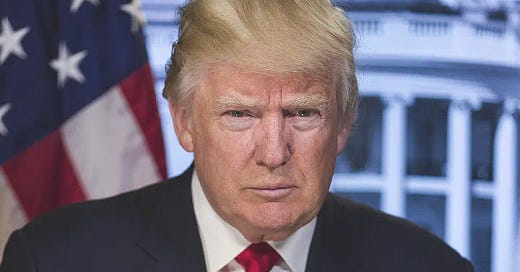Could unity-minded Trump back reparations for slavery, make other unexpectedly bold moves in healing impulse for nation
In early March, after reading polls showing former President Donald Trump's ascendency with Black voters, I began asking a highly speculative question of Black leaders, and Republican insiders and others in politics, about whether Trump, who has long had a loyalty lock on his base, could support some form of reparations for slavery in an effort to boost himself in swing states while not losing durable, reliable support.
All sources, whom I talked to both on the record and off, depending on the venue and, honestly, the time and primary purpose for the interview, took the question seriously. No one I talked to fully dismissed the prospect.
Trump has at times seemed obsessed with his standing and polling in the Black community, and movement there, even if small, could cut into the Democratic firewall and reshape election dynamics.
Calling for reparations, even if in the form of a serious commission to study how to do it, whether through direct payments to descendants of enslaved people, or through support of historically Black institutions and regions, would seem to be a move, whether genuinely or cynically motivated, that Trump would consider.
"It's not a far-fetched concept," long-time Iowa Democratic State Rep. Ako Abdul-Samad of Des Moines, who is Black, told me at Smokey Row coffee house in the capital city in March. "I could see it being presented. The follow through would be my concern. You can say something to move the emotions of people, but that doesn't mean you are going to follow through."
Now, months later, as Trump insists he's going to deliver a speech focused on "unity" in the wake of an assassination attempt on his life, the former president, a living martyr to millions of Americans who insists he trashed a more negative Republican National Convention speech in favor of a better-angels impulse, would have the political capital to call for reparations for slavery as a major step toward acknowledging America's original sin and the continued racial division stirring the democracy-shaking discord.
What's more, if he's serious about toning down the political temperature, Trump could make a number of other bold pronouncements in his convention speech this week.
He has a moment here, an historic one, and the iconic imagery of him with fist raised and face bloodied in the moments after he was nearly gunned down, allow him to operate outside of party or ideological confines in a way no other presidential candidate (in a major party) in history could have.
Trump could direct his supporters to remove any signs with negative or mocking language about President Biden from the convention and his future rallies, and urge them to instead focus on Trump's own message, his own strengths as they see them.
Trump could say the cruel nicknames he's dispensed and affixed were wrong, and without repeating the nicknames, look into the audience and apologize to Marco Rubio and Nikki Haley and Ted Cruz, and then stare into the camera and do the same for Hillary Clinton and President Biden and former President Obama.
He could engage in the greatest Mea culpa in world history and take responsibility for his own role in the politics of the modern era, saying simply that both parties need to turn the temperature down, and that it's going to start with him, that he knows he went too far at times, that he got carried away with his nicknames and the exchanges — and that he's re-examined himself in a "reborn" way as he knows how fortunate he is to have a second chance in life now.
Then he could call on Biden to run a similarly positive campaign, which would place Democrats in an awful position because they need to make the race about Trump and his provocations. This is the way to view such a unity approach cynically. Having to follow Trump with a positive campaign pledge would knee-cap Biden politically.
Here's the reality. The iconic images of Trump in the post-rally-shooting defiance speak so loudly for him that there is another role available for the reality TV star turned president. He can opt to be more Gary Cooper than P.T. Barnum now.
Trump may have the most finely tuned political instincts in American history. He sensed the demand for divisions, and played into them brilliantly. But now, maybe there is a Trump sense that we have veered to within in an inch of a second civil war erupting.
Then again, Trump just selected J.D. Vance, the Frank Lloyd Wright of the white-grievance architecture in America today, as his running mate.
Mea culpa or more of the same?
We will see this week.
(Douglas Burns, a fourth-generation Iowa journalist from Carroll, is a member of the Iowa Writers’ Collaborative. Read dozens of the most talented writers in Iowa in just one place. The Iowa Writers' Collaborative spans the full state. It’s one of the biggest things going in Iowa journalism and writing now — and you don’t want to miss. This collaborative is — as the outstanding Quad Cities journalist Ed Tibbetts says — YOUR SUNDAY IOWA newspaper. )
Please consider listening to the Iowa Writers Collaborative politics podcast. We have just launched it.





I can't frankly think of a single time this man has apologized for anything he has done. I don't see him starting now. He wants to be a dictator and in picking Vance has selected someone who will encourage his nastiest and most violent tendencies.
I have a hard time seeing Trump advocating for reparations, even if just for show/to get votes. Even more importantly, I have a hard time believing people would believe him if he did. I wouldn’t. Regarding the seizing the opportunity for the greatest mea culpa in history, I’m casting my vote for “more of the same” even if it somehow looks different initially.